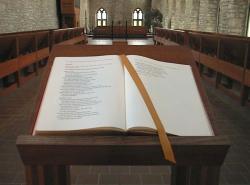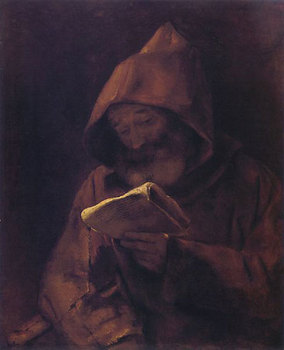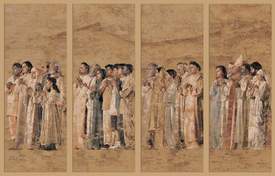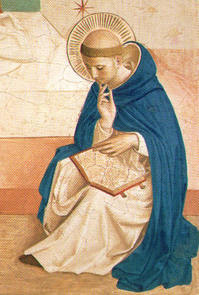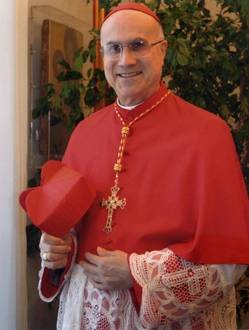 I am happy to be in Astana, capital of the Republic of Kazakhstan, this noble and vast country located in the heart of the Eurasian territory. I wish to express my profound joy at being able to visit your Cathedral of the Assumption, recently opened for worship. I greet everyone with affection, beginning with His Eminence Metropolitan Alexander and, while I thank him for his fraternal reception, I bring to him and to all of you the cordial greeting of the Holy Father Benedict XVI, praying that it be transmitted to His Holiness Kirill, patriarch of Moscow and All Russias. I then greet the other religious (and civil) authorities, the priests, deacons and faithful of the Orthodox Church of Kazakhstan. May this fraternal meeting of ours inspire a renewed impetus to join forces, so that in a not distant future we, the disciples of Christ, can proclaim with one voice and one heart the Gospel, message of hope for the whole of humanity.
I am happy to be in Astana, capital of the Republic of Kazakhstan, this noble and vast country located in the heart of the Eurasian territory. I wish to express my profound joy at being able to visit your Cathedral of the Assumption, recently opened for worship. I greet everyone with affection, beginning with His Eminence Metropolitan Alexander and, while I thank him for his fraternal reception, I bring to him and to all of you the cordial greeting of the Holy Father Benedict XVI, praying that it be transmitted to His Holiness Kirill, patriarch of Moscow and All Russias. I then greet the other religious (and civil) authorities, the priests, deacons and faithful of the Orthodox Church of Kazakhstan. May this fraternal meeting of ours inspire a renewed impetus to join forces, so that in a not distant future we, the disciples of Christ, can proclaim with one voice and one heart the Gospel, message of hope for the whole of humanity.
The occasion of this agreeable visit to Astana is the summit of heads of state and government of countries of the Organization for Security and Cooperation in Europe (OSCE), which will take place in the next few days. This circumstance suggested to the highest authorities of Kazakhstan to address to me a cordial invitation to visit your land. In willingly receiving this deferent and appreciated gesture, I immediately thought of the joy of being able to go to a country in which there are ample possibilities for a peaceful and profitable religious coexistence. In this context, for us Christians the duty of reciprocal love is all the more urgent: we are called, in fact, to give witness to all, with words and works, that God is Love. In this connection, my presence also intends to be an encouragement to continue on the way of great respect and affection, which I know exists between the Orthodox and Catholic communities of Astana, as well as of other cities. Propitious occasions are not lacking, dear friends, of mutual support and of deepening of friendship.
Today, in this welcome meeting with you, I have the special joy of fulfilling the lofty task entrusted to me by the Holy Father Benedict XVI, of handing you a fragment of the distinguished relics of the Apostle St. Andrew, which are venerated in Italy, in the city of Amalfi. This assignment, which I am honored to effect in the hands of His Eminence Metropolitan Alexander, comes in response to the devout request that his predecessor, Metropolitan Mefodji, and Archbishop Tomash Peta, Catholic Metropolitan, jointly addressed to Pope Benedict XVI. The Pontiff, gladly desiring to meet the ardent request, decided to send to the two respective Churches two fragments of the precious relics. This choice has a profound significance, in as much as is underlines the common veneration of the Apostles.
I am happy to stress that today’s event of handing the relic of St. Andrew, who you venerate, coincides in fact with the day in which, according to the calendar of the Latin Church, his liturgical feast is celebrated. Andrew was born in Bethsaida, at first he was a disciple of John the Baptist and then he followed the Lord Jesus, to whom he also led his brother Peter. Together with Philip he presented Christ himself to the Gentiles and pointed out the boy who carried the fish and the loaves. According to tradition, after Pentecost, he preached in different areas and was crucified in Achaia, Greece. The Gospel narrates that Jesus, “passing along by the Sea of Galilee, saw Simon and Andrew the brother of Simon casting a net in the sea; for they were fishermen. And Jesus said to them, ‘Follow me and I will make you fishers of men'” (Mark 1:16-17). Andrew, hence, was the first of the Apostles to be called to follow Jesus. Precisely on the basis of this fact, the Byzantine liturgy honors him with the name of Protoklitos, which means precisely, the first called.
The evangelical account continues specifying that “immediately they left their nets and followed him” (Mark 1:18). It is this quick adherence that allowed the Apostles to spread the Word, the “good news” of salvation. Faith comes from listening, and what is heard is the Word of Christ, which still today the Church spreads to the ends of the earth. This Word is the indispensable food of the soul. It is said in the book of the prophet Amos that God will put hunger in the world, not hunger for bread, but to hear his word (cf. Amos 8:11). This is a healthy hunger, because it makes us seek constantly and receive the Word of God, knowing that it must nourish us for the whole of life. Nothing in life can have consistency, nothing can really satisfy us if it is not nourished, penetrated, illumined, guided by the Word of the Lord. Moreover, an ever more profound commitment of radical adherence to this Word, together with the support of the Holy Spirit, constitute the strength to realize the aspiration of every Christian community and of every individual faithful to unity (cf. Benedict XVI, Apostolic Exhortation Verbum Domini, No. 46).
From the Gospel of St. John, we gather another important particular regarding the Apostle Andrew: “He first found his brother Simon, and said to him, ‘We have found the Messiah’ (which means Christ. He brought him to Jesus” (John 1:41-43), demonstrating immediately an unmistakable apostolic spirit. To this end, St. John Chrysostom comments: “Andrew’s word is the word of one who anxiously awaited the coming of the Messiah, whose descent from heaven he awaited, who trembled with joy when he saw him arrive, and who hurried to communicate the great news to the others. See in what way he notifies what he had appreciated in a short time? Andrew, after having stayed with Jesus and having learned everything that Jesus taught him, did not keep the treasure to himself, but hurried to his brother to communicate to him the richness he had received. Look also at Peter’s spirit, from the beginning docile and quick in faith: he runs immediately without being concerned about anything else” (Homily 19, 1; PG 59, 120).
In the beautiful icon donated by Patriarch Athenagoras I to Pope Paul VI on Jan. 5, 1964, the two Holy Apostles, Peter the Coryphaeus and Andrew the Protoklitos, embrace, in an eloquent language of love, beneath the glorious Christ. Andrew was the first to follow the Lord, Peter was called to confirm his brothers in the faith. Their embrace under the gaze of Christ is an invitation to continue the path undertaken, toward that goal of unity that we intend to reach together. Nothing must discourage us, but we must go forward with hope, supported by the intercession of the Apostles Peter and Andrew, as well as by the maternal protection of Mary Most Holy, Mother of Christ and our Mother. Let us ask God with particular intensity for the precious gift of unity among all Christians, making our own the invocation that Jesus raised to the Father for his disciples: “that they may all be one; even as thou, Father, art in me, and I in thee, that they also may be in us, so that the world may believe that thou hast sent me” (John 17:21).
